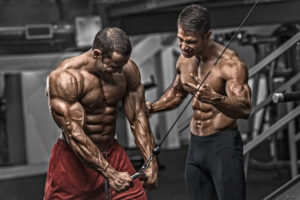Would you like to know the answers to the best fitness questions? Fitness is an essential part of living a healthy lifestyle. Scientists have shown fitness reduces the risks of certain diseases, improves your mood, and helps you live longer. However, fitness can be particularly confusing for beginners just starting a fitness journey. Luckily for all those people, this article will answer the best questions on a fitness journey!
How do I get started? What is the best diet to eat? How fast can I lose weight? These are some of the best questions, among many others, that we provide answers to in this article! As a bonus, we also provide you with the best questions to ask a fitness trainer and what answers to expect before signing up.
A beginner needs answers to the ten questions on a fitness journey
- How do I get started?
- How do I create a six-pack?
- What is the best diet to eat?
- How do I build a muscular chest?
- How fast can I lose weight?
- What does it take to gain muscle?
- How do I look like a bodybuilder without using steroids?
- How do I make my muscles bigger?
- What is my max on the major lifts?
- How do I get bigger arms?

Answers to the ten best questions every beginner needs to know on a fitness journey
1. How do I get started?
The first step is to take inventory and find out how healthy and fit you are because you can only start where you are at. Your starting point is critical to your success. The first thing you should do is test your health and fitness through measurements and activities.
Only what you measure will grow. Thus, get on the scale, visit your doctor, and determine your one-repetition maximum for each lift or how far you can run in 12 minutes. Knowing your limits will help you determine what success looks like for you.
2. How do I create a six-pack?
Everyone has a six-pack when you uncover the fat that prevents you from seeing it. Therefore, you will see your six-pack if you lose the stomach fat. The best way to do this is through exercise and diet. However, your diet plays a more prominent role than exercise. The best body is built in the kitchen, not the gym.
3. How do I build a muscular chest?
To build a muscular chest, you must perform compound and isolation lifts. Compound lifts like the bench press build overall mass, while isolation lifts like the fly focus on the troubled areas. Muscle hypertrophy happens around 75% of 1rpm, 8 – 12 reps per set, and 8 – 26 sets per week.
As a general guideline, perform 3 – 5 sets for each exercise, which means you can do 4 – 5 activities. Build your chest workout around your compound lifts, including 1 – 2 isolation lifts. Use progressive overload and periodization to improve your training as you become a more experienced lifter.
4. How fast can I lose weight?
It takes a 3500-calorie deficit to lose a pound of body fat. When you lose weight, it is not all fat. Some of the weight you lose is muscle and water, so tread carefully. The faster the weight loss, the more muscle you lose because muscle weighs more than fat. Also, losing water weight can leave you feeling sluggish and dehydrated. The body is around 67% water. Most experts suggest you lose between 1 – and 3 pounds a week to preserve your health and muscle.
5. What does it take to gain muscle?
The answer is not cut and dry. It depends on your experience and genetics. There is only so much muscle you can add to your frame. Most experts believe the average novice can add 1 – 2 pounds of muscle each month. But, like fat, when you add muscle too quickly, you gain more fat than muscle. It also takes a 3500-calorie surplus to build a pound of muscle.
However, muscle is more difficult to gain than to lose body fat because muscle requires hormones and resistance training. Also, protein is the only nutrient that builds muscles. The other nutrients help. Fat provides the essential ingredients that hormones need to stay balanced and active. In comparison, carbohydrates provide the energy you need to workout and build muscle in the gym.
6. What is the best diet to eat?
The best diet to eat is the one that will help you live longer and more robust. Do you agree? To stay healthy, you need a balanced diet that provides the body with all the essential nutrients. The only harmful nutrients are processed foods and drinks. Eating whole-natural foods means reaching your health and fitness goals regardless of what food group they come from.
Always follow the recommended serving sizes. Food producers place nutritional facts on the labels. While fruits and vegetables do not provide dietary facts labels, you can always Google them. Also, drink plenty of water and eat the recommended amount of fiber. They both help to keep the body clean and healthy.
7. How do I look like a bodybuilder without using steroids?
When you find the answer to this question, please let us know. The quick response is you can’t. Steroids tell the body to make all of your food and build muscle. Your hormones will never reveal your body, only to build muscle with your food. Some of it will be stored as fat. Also, once you reach your genetic potential, your hormones will tell your body to stop building muscle.
Steroids are unnatural; their only purpose is to tell your body to build muscle regardless of the health complication. While you can create a perfect natural physique, your hormones refuse to replicate what steroids can do because of health problems.
8. How do I make my muscles bigger?
Any resistance training for a person who just started lifting (0 – 2 years) will cause muscle hypertrophy when done correctly. However, to take it to the next level, eat a diet high in protein with a calorie surplus and get 8 – 10 hours of sleep each night. Also, drink water and eat the recommended fiber so that the body can stay hydrated and clean.
Next, use progressive overload and periodization to stimulate your muscles and activate the hormones that tell your body to build muscle. Then, lift 65% – 80% of your 1rpm with each rep. Also, lift 8 – 12 repetitions and 3 – 4 sets for each exercise. Finally, compound lifts work the muscles, joints, tendons, and bones while activating the hormones that tell your body to build muscle.
9. What is my max on the major lifts?
The average person can lift their weight on most of the compound lifts. The exception is the overhead press. A strong person can lift 1.5 times their body weight. An athletic person can lift two times their body weight and more.
The goal should be to focus on lifting the weight the correct way. If you lift with good form, you will increase your lift. Getting the right amount of exercise, nutrients, and sleep will help you reach your genetic potential faster. Take a more holistic approach to your fitness goals and notice how quickly you get them.
10. How do I create bigger arms?
To build bigger arms, you must focus on the bicep and the tricep, but more emphasis should be placed on the tricep. The tricep is two times larger than the bicep, giving the arms a more prominent appearance. Compound lifts such as bench presses, weighted dips, pushups, curls, pull-ups, and skull crushers will help you build larger arms.
Compound lifts are more effective than isolation lifts because they activate the hormones that tell your body to build muscle. They do this by stressing muscles, tendons, ligaments, and bones, which force the body to adapt to defend itself. Muscle hypertrophy is a hormonal response to protect the body against damage caused by resistance training. Thus resistance training breaks the muscles down, and rest gives the hormones the time to tell the body how to repair and rebuild.

The ten best fitness questions you need answers to from a certified fitness trainer before signing up?
- What is your fitness philosophy?
- What emphasis do you place on a diet?
- How often do you train clients?
- What credentials do you have?
- What is your first step?
- How do you keep your trainees motivated?
- How do you break through plateaus?
- Do you have a referral list?
- What is your training schedule?
- How many clients are you currently working with?
1. What is your fitness philosophy?
This question will help you determine if the trainer can help you reach your fitness goals fun and engaging way. After all, it would be best if you bought into their philosophy to make it work. Psychologists say first impressions are lasting.
So when the trainer starts talking about their fitness philosophy, envision what that means for you, and if you can, get excited about what they are saying. It would be best if you were emotionally, mentally, and physically invested in reaching your fitness goals. It will not be a good fit for you if it doesn’t sound good. A fitness journey should speak to you and align with your lifestyle. The best fitness journey is the one you can stick with.
2. What emphasis do you place on a diet?
Let’s face it, your diet is the elephant in the room, and that is because it is the most significant part of your health and fitness journey. But unfortunately, it can quickly sabotage anything you are doing in the gym.
A good trainer will focus on the details of your workout and the big picture of your diet. For example, reminding someone to drink water and eat fiber and protein only takes a few seconds. Also, the trainer should have access to many online fitness calculators that quickly help them to let you know how many calories you need to eat to reach your fitness goals.
3. How often do you train clients?
This question is crucial because it lets you know if they are too busy or no one trusts them. You don’t want to work with someone who doesn’t have the time to train you correctly. Also, you don’t want to be a trainer’s experiment.
Experienced trainers know the ropes from years of practice and trial and error. They speak from their mistakes with other trainees when they say something will not work. Finally, you do not want to be a trainer’s learning curve unless they offer free sessions. You get what you pay for, or you should hope so.
4. What credentials do you have?
This question is an opportunity for the trainer to showcase their commitment to health and fitness. They should have a certification and attend workshops and training to stay current on the latest health and fitness news.
Things change very fast in health and fitness due to the changes in knowledge and technology. Also, a trainer’s credentials show you how passionate they are about their profession. Passion is contagious. It helps to workout with someone who loves to train and gets you excited about working out.
5. What is our first step?
This open-ended question allows you to see what is essential to the trainer. Do they start talking about money, the workout, or your goals? Hopefully, they will start talking about what is important to you.
There will be plenty of time to talk about the essential things: the money and workout once they know what is necessary to you. A good trainer cares about you and your goals. They are not self-centered.
6. How do you keep your trainees motivated?
The trainer should have motivational and engaging ways to keep you excited about your workout in his toolbox. If it takes them too long to answer or provide you with a response that you do not like, it is time to move on. However, there will be times when you will need to be motivated to workout.
You might be excited initially, but that will fade at some point. It is human nature, and it happens to the best of us. Your trainer should anticipate this emotional plateau and change your routine, workout music, use online platforms, or provide a reward for reaching a short-term goal. A good trainer will understand your support system and help you use it also to stay motivated.
7. How do you break through plateaus?
This question is crucial because you will have plateaus on your journey. Some of them may be self-inflicted, while others may be natural. A good trainer knows all about plateaus and how to break through them. They use time-proven strategies to help you move past a plateau.
This question gives the trainer a chance to show off their knowledge. If they struggle with this question, you need to pass. The best trainers have plenty of experience in helping clients break through plateaus. A plateau means the trainer has clients who have been around for a while and have reached many fitness goals with the trainer’s help.
8. Do you provide a referral list?
This question is meant to see if the trainer is active and involved in the health and fitness industry. Good trainers work with other professionals. They also know their role and stay in their lane. As a result, they do not bite off more than they can chew or advise you in areas where they do not have expertise.
A trainer is not a doctor, massage therapist, nutritionist, or hormone therapist. Good trainers work with other professionals. They refer and get referred to by other professionals. Also, they are genuinely invested in the health and fitness community. Thus, they should also inquire about your doctor visits during your first meeting. You can gain a lot of valuable information from health reports and bloodwork. For example, it’s essential to know if a client has diabetes or high blood pressure. In addition, medical records give insight into diet and lifestyle.
9. What does your training schedule look like?
This question is similar to how often you train but has a different meaning. Here you want to know if there is a conflict between your schedule and theirs. Most of us live busy lives and have to work.
Therefore it is essential to know that the trainer is available when we can train. You don’t want your training to keep getting canceled because the trainer can’t schedule you for your available times. So make sure you are very clear about when you are open to training before signing up.
10. How many clients are you currently working with?
This question gives insight into how successful the trainer has been in training clients. After all, if it works, they will keep coming back and telling others about the trainer.
So it would be best if you asked this question last because they need to be compatible and available for the trainer to be a good fit for you. Also, this question should confirm what you already know from the other questions. But more importantly, it reassures you that the facts support their presentation.

The last word on the best fitness questions and answers to know at the start of a fitness journey
The start of a fitness journey can be an exciting time, but as the dust settles, the journey will take longer or fail if it is not built on a solid foundation. Thus it is vital to ask the best fitness questions at the start of a fitness journey and get answers early.
It can seem like a challenge to find quality fitness advice with all the information. But with these ten best fitness questions and answers as your guide, you’ll be able to stay on track without any uncertainties or doubts about what is best for you. We tried to cover a broad range of relevant topics for many people looking to get healthier, build muscle, or lose weight.
Please share this list of questions and answers with those who need guidance in their journey! What has been your experience with finding good fitness advice? If you or someone you know is looking to improve your health, share this article on Facebook or Twitter so that others can learn more about self-care.




